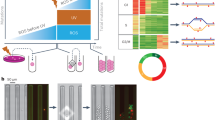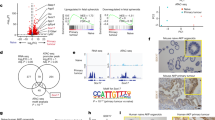Abstract
K-ras mutation occurs in 40–50% of human colorectal adenomas and carcinomas, but its contribution to intestinal tumorigenesis in vivo is unclear. We developed K-rasV12 transgenic mice that were crossed with Ah-Cre mice to generate K-rasV12/Cre mice, which showed β-naphthoflavone-induction of Cre-mediated LoxP recombination that activated intestinal expression of K-rasV12 4A and 4B transcripts and proteins. Only very occasional intestinal adenomas were observed in β-naphthoflavone-treated K-rasV12/Cre mice aged up to 2 years, suggesting that mutated K-ras expression alone does not significantly initiate intestinal tumourigenesis. To investigate the effects of mutated K-ras on DNA mismatch repair (MMR)-deficient intestinal tumour formation, these mice were crossed with Msh2−/− mice to generate K-rasV12/Cre/Msh2−/− offspring. After β-naphthoflavone treatment, K-rasV12/Cre/Msh2−/− mice showed reduced average lifespan of 17.3±5.0 weeks from 26.9±6.8 (control Msh2−/− mice) (P<0.01). They demonstrated increased adenomas in the small intestine from 1.41 (Msh2−/− controls) to 7.75 per mouse (increased fivefold, P<0.01). In the large intestine, very few adenomas were found in Msh2−/− mice (0.13 per mouse) whereas K-rasV12/Cre/Msh2−/− mice produced 2.70 adenomas per mouse (increased 20-fold, P<0.01). Over 80% adenomas from K-rasV12/Cre/Msh2−/− mice showed transgene recombination with expression of K-rasV12 4A and 4B transcripts and proteins. Sequencing of endogenous murine K-ras showed mutations in two out of 10 tumours examined from Msh2−/− mice, but no mutations in 17 tumours from K-rasV12/Cre/Msh2−/− mice. Expression of K-rasV12 in tumours caused activation of the mitogen-activated protein kinase and Akt/protein kinase B signaling pathways, demonstrated by phosphorylation of p44MAPK, Akt and GSK3β, as well as transcriptional upregulation of Pem, Tcl-1 and Trap1a genes (known targets of K-rasV12 expression in stem cells). Thus, mutated K-ras cooperates synergistically with MMR deficiency to accelerate intestinal tumorigenesis, particularly in the large intestine.
This is a preview of subscription content, access via your institution
Access options
Subscribe to this journal
Receive 50 print issues and online access
$259.00 per year
only $5.18 per issue
Buy this article
- Purchase on Springer Link
- Instant access to full article PDF
Prices may be subject to local taxes which are calculated during checkout







Similar content being viewed by others
References
Al-Aynati MM, Radulovich N, Riddell RH, Tsao MS . (2004). Epithelial-cadherin and beta-catenin expression changes in pancreatic intraepithelial neoplasia. Clin Cancer Res 10: 1235–1240.
Andreyev HJ, Norman AR, Cunningham D, Oates J, Dix BR, Iacopetta BJ et al. (2001). Kirsten ras mutation in patients with colorectal cancer: the ‘RASCAL II’ study. Br J Cancer 85: 692–696.
Arends MJ, Frayling I . (2004). The genetics of colorectal cancer: mismatch repair deficiency in hereditary and sporadic colorectal cancer. In: Cunningham D, Topham C, Miles A (eds). Key Advances in the Effective Management of Colorectal Cancer Chapter 2, 4th edn., Aesculapius Medical Press: London, pp 25–40.
Arends MJ, McGregor AH, Toft NJ, Brown EJ, Wyllie AH . (1993). Susceptibility to apoptosis is differentially regulated by c-myc and mutated Ha-ras oncogenes and is associated with endonuclease availability. Br J Cancer 68: 1127–1133.
Arends MJ, McGregor AH, Wyllie AH . (1994). Apoptosis is inversely related to necrosis and determines net growth in tumours bearing constitutively expressed myc, ras, and HPV oncogenes. Am J Pathol 144: 1045–1057.
Barbacid M . (1987). Ras genes. Annu Rev Biochem 56: 779–827.
Brooks DG, James RM, Patek CE, Williamson J, Arends MJ . (2001). Mutant K-ras enhances apoptosis in embryonic stem cells in combination with DNA damage and is associated with increased levels of p19 (ARF). Oncogene 20: 2144–2152.
Capon DJ, Seebrug PH, McGrath JP, Hayflick JS, Edman U, Levinson AD et al. (1983). Activation of Ki-ras2 gene in human colon and lung carcinomas by two different point mutations. Nature 304: 507–513.
Caulin C, Nguyen T, Longley MA, Zhou Z, Wang XJ, Roop DR . (2004). Inducible activation of oncogenic K-ras results in tumour formation in the oral cavity. Cancer Res 64: 5054–5058.
de Wind N, Dekker M, Berns A, Radman M, te Riele H . (1995). Inactivation of the mouse Msh2 gene results in mismatch repair deficiency, methylation tolerance, hyperrecombination, and predisposition to cancer. Cell 82: 321–330.
de Wind N, Dekker M, van Rossum A, van der Valk M, te Riele H . (1998). Mouse models for hereditary nonpolyposis colorectal cancer. Cancer Res 58: 248–255.
Dinulescu DM, Ince TA, Quade BJ, Shafer SA, Crowley D, Jacks T . (2005). Role of K-ras and Pten in the development of mouse models of endometriosis and endometrioid ovarian cancer. Nat Med 11: 63–70.
Fearon ER, Hamilton SR, Vogelstein B . (1987). Clonal analysis of human colorectal tumours. Science 238: 193–197.
Frayling IM, Happerfield L, Mattocks C, Oakhill K, Arends MJ . (2005). Application of molecular diagnostics to hereditary nonpolyposis colorectal cancer (Chapter 32). In: Coleman WB, Tsongalis GJ (eds). Molecular Diagnostics, For the Clinical Laboratorian 2nd edn. Humana Press Inc: NJ, pp 375–392.
Guerra C, Mijimolle N, Dhawahir A, Dubus P, Barradas M, Serrano M et al. (2003). Tumour induction by an endogenous K-ras oncogene is highly dependent on cellular context. Cancer Cell 4: 111–120.
Ireland H, Kemp R, Houghton C, Howard L, Clark AR, Sansom OJ et al. (2004). Inducible Cre-mediated control of gene expression in the murine gastrointestinal tract: effect of loss of β-catenin. Gastroenterology 126: 1236–1246.
Jackson EL, Willis N, Mercer K, Bronson RT, Crowley D, Montoya R et al. (2001). Analysis of lung tumour initiation and progression using conditional expression of oncogenic K-ras. Genes Dev 15: 3243–3248.
James RM, Arends MJ, Plowman S, Brooks DG, Miles CG, West JD et al. (2003). K-ras proto-oncogene exhibits tumour suppressor activity as its absence promotes tumorigenesis in murine teratomas. Mol Cancer Res 1: 820–825.
Janssen KP, Abala M, EI Marjou F, Louvard D, Robine S . (2005). Models of K-ras-initiated carcinogenesis. Biochim Biophys Acta 1756: 145–154.
Janssen KP, Marjou FE, Pinto D, Sastre X, Rouillard D, Fouquet C et al. (2002). Targeted expression of oncogenic K-ras in intestinal epithelium cause spontaneous tumourigenesis in mice. Gastroenterology 123: 492–504.
Jiricny J, Nystrom-Lahti M . (2000). Mismatch repair defects in cancer. Curr Opin Genet Dev 10: 157–161.
Johnson L, Mercer K, Greenbaum D, Bronson RT, Crowley D, Tuveson DA et al. (2001). Somatic activation of the K-ras oncogene causes early onset lung cancer in mice. Nature 410: 1111–1116.
Kim SH, Roth KA, Moser AR, Gordon JI . (1993). Transgenic mouse models that explore the multistep hypothesis of intestinal neoplasia. J Cell Biol 123: 877–893.
Kinzler KW, Vogelstein B . (1996). Lessons from hereditary colorectal cancer. Cell 87: 159–170.
Luo F, Hamoudi R, Brooks DG, Patek CE, Arends MJ . (2007). Microarray profiling of changes in gene expression induced by K-rasVal12 in embryonic stem cells. (Submitted Manuscript to BMC Genomics).
Malumbres M, Barbacid M . (2003). RAS oncogenes: the first 30 years. Nat Rev Cancer 3: 459–465.
Meuwissen R, Linn SC, van der Valk M, Mooi WJ, Berns A . (2001). Mouse model for lung tumorigenesis through Cre/lox controlled sporadic activation of the K-Ras oncogene. Oncogene 20: 6551–6558.
Morris RG, Curtis LJ, Romanowski P, Hardcastle JD, Jenkins DA, Robinson M et al. (1996). Ki-ras mutations in adenomas: a characteristic of cancer-bearing colorectal mucosa. J Pathol 180: 357–363.
Otori K, Oda Y, Sugiyama K, Hasebe T, Mukai K, Fujii T et al. (1997). High frequency of K-ras mutations in human colorectal hyperplastic polyps. Gut 40: 660–663.
Plowman SJ, Arends MJ, Brownstein DG, Luo F, Devenney PS, Rose L et al. (2006a). The K-Ras 4A isoforms promotes apoptosis but does not affect either lifespan or spontaneous tumour incidence in ageing mice. Exp Cell Res 312: 16–26.
Plowman SJ, Berry RL, Bader SA, Luo F, Arends MJ, Harrison DJ et al. (2006b). K-ras 4A and 4B are co-expressed widely in human tissues, and their ratio is altered in some sporadic colorectal cancers. J Exp Clin Cancer Res 25: 259–267.
Plowman SJ, Williamson DJ, O’Sullivan MJ, Doig J, Ritchie A-M, Harrison DJ et al. (2003). While K-ras is essential for mouse development, expression of the K-ras 4A splice variant is dispensable. Mol Cell Biol 23: 9245–9250.
Qian J, Niu J, Li M, Chiao PJ, Tsao MS . (2005). In vitro modeling of human pancreatic duct epithelial cell transformation defines gene expression changes induced by K-ras oncogenic activation in pancreatic carcinogenesis. Cancer Res 65: 5045–5053.
Reitmair AH, Redston M, Cai JC, Chuang TC, Bjerknes M, Cheng H et al. (1996). Spontaneous intestinal carcinomas and skin neoplasms in Msh2-deficient mice. Cancer Res 56: 3842–3849.
Reitmair AH, Schmits R, Ewel A, Bapat B, Redston M, Mitri A et al. (1995). MSH2 deficient mice are viable and susceptible to lymphoid tumours. Nat Genet 11: 64–70.
Sansom OJ, Meniel V, Wilkins JA, Cole AM, Oien KA, Marsh V et al. (2006). Loss of Apc allows phenotypic manifestation of the transforming properties of an endogenous K-ras oncogene in vivo. Proc Natl Acad Sci (USA) 103: 14122–14127.
Shivapurkar N, Huang L, Ruggeri B, Swalsky PA, Bakker A, Finkelstein S et al. (1997). K-ras and p53 mutations in aberrant crypt foci and colonic tumours from colon cancer patients. Cancer Lett 115: 39–46.
Spandidos DA, Wilkie NM . (1984). Malignant transformation of early passage rodent cells by a single mutated human oncogene. Nature 310: 469–475.
Toft NJ, Arends MJ . (1998). DNA mismatch repair and colorectal cancer. J Pathol 185: 123–129.
Toft NJ, Curtis LJ, Sansom OJ, Leitch AL, Wyllie AH, Te Riele H et al. (2002). Heterozygosity for p53 promotes microsatellite instability and tumorigenesis on a Msh2 deficient background. Oncogene 21: 6299–6306.
Toft NJ, Winton DJ, Kelly J, Howard LA, Dekker M, te Riele H et al. (1999). Msh2 status modulates both apoptosis and mutation frequency in the murine small intestine. Proc Natl Acad Sci (USA) 96: 3911–3915.
Tuveson DA, Shaw AT, Willis NA, Silver DP, Jackson EL, Chang S et al. (2004). Endogenous oncogenic K-ras (G12D) stimulates proliferation and widespread neoplastic and developmental defects. Cancer Cell 5: 375–387.
Yamada S, Yashiro M, Maeda K, Nishiguchi Y, Hirakawa K . (2005). A novel high-specificity approach for colorectal neoplasia: detection of K-ras2 oncogene mutation in normal mucosa. Int J Cancer 113: 1015–1021.
Zhu CQ, Blackhall FH, Pintilie M, Iyengar P, Liu N, Ho J et al. (2004). Skp2 gene copy number aberrations are common in non-small cell lung carcinoma, and its overexpression in tumours with ras mutation is a poor prognostic marker. Clin Cancer Res 10: 1984–1991.
Acknowledgements
We thank Clive Lebozer and Xinping Gong (Department of Pathology, University of Cambridge) for technical assistance. This work was supported by grants from Cancer Research UK and the Wellcome Trust.
Author information
Authors and Affiliations
Corresponding author
Rights and permissions
About this article
Cite this article
Luo, F., Brooks, D., Ye, H. et al. Conditional expression of mutated K-ras accelerates intestinal tumorigenesis in Msh2-deficient mice. Oncogene 26, 4415–4427 (2007). https://doi.org/10.1038/sj.onc.1210231
Received:
Revised:
Accepted:
Published:
Issue Date:
DOI: https://doi.org/10.1038/sj.onc.1210231
Keywords
This article is cited by
-
Mouse model of proximal colon-specific tumorigenesis driven by microsatellite instability-induced Cre-mediated inactivation of Apc and activation of Kras
Journal of Gastroenterology (2016)
-
Animal models of colorectal cancer
Cancer and Metastasis Reviews (2013)
-
Homeobox gene Rhox5 is regulated by epigenetic mechanisms in cancer and stem cells and promotes cancer growth
Molecular Cancer (2011)
-
Activation of K-RAS by co-mutation of codons 19 and 20 is transforming
Journal of Molecular Signaling (2011)
-
The activating mutation R201C in GNAS promotes intestinal tumourigenesis in ApcMin/+ mice through activation of Wnt and ERK1/2 MAPK pathways
Oncogene (2010)



